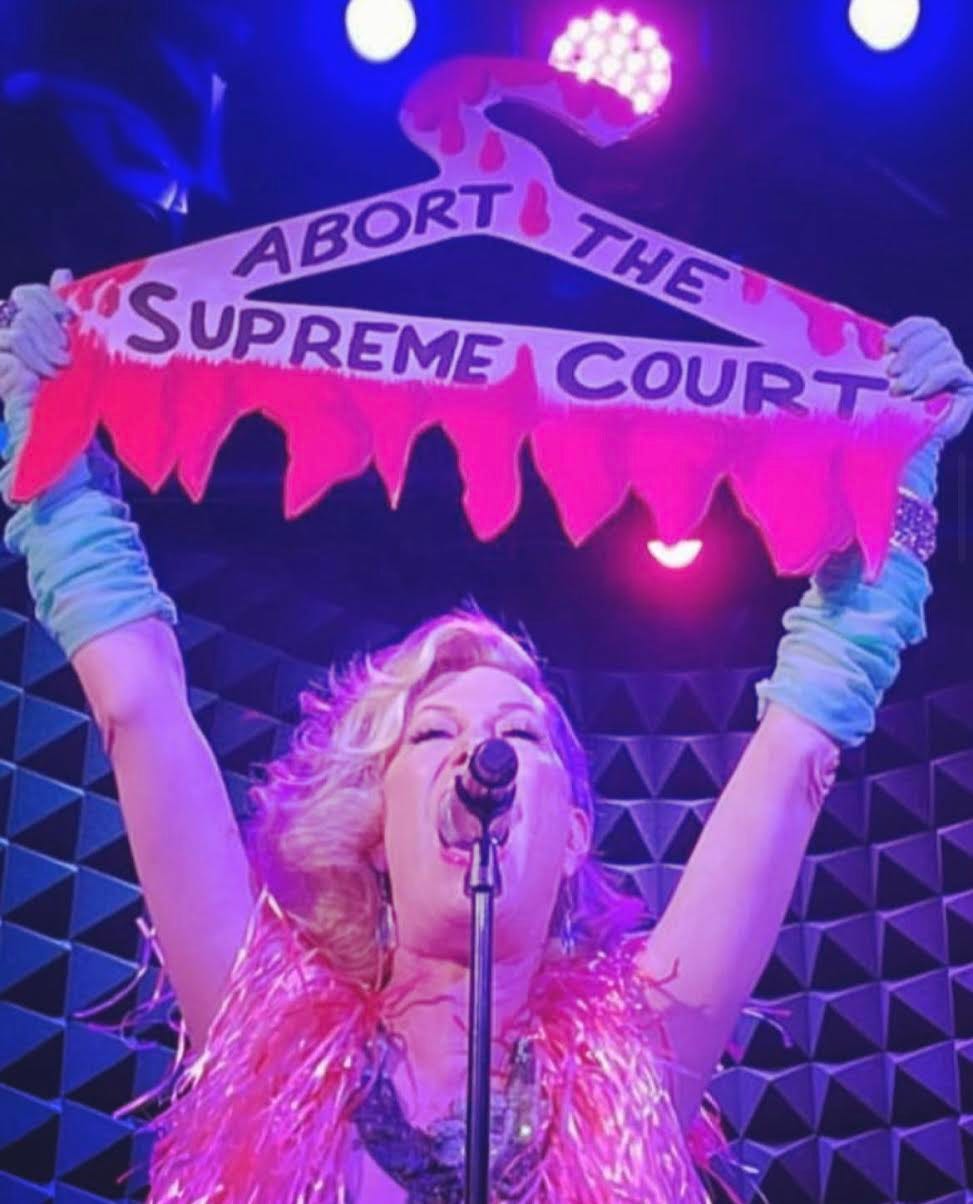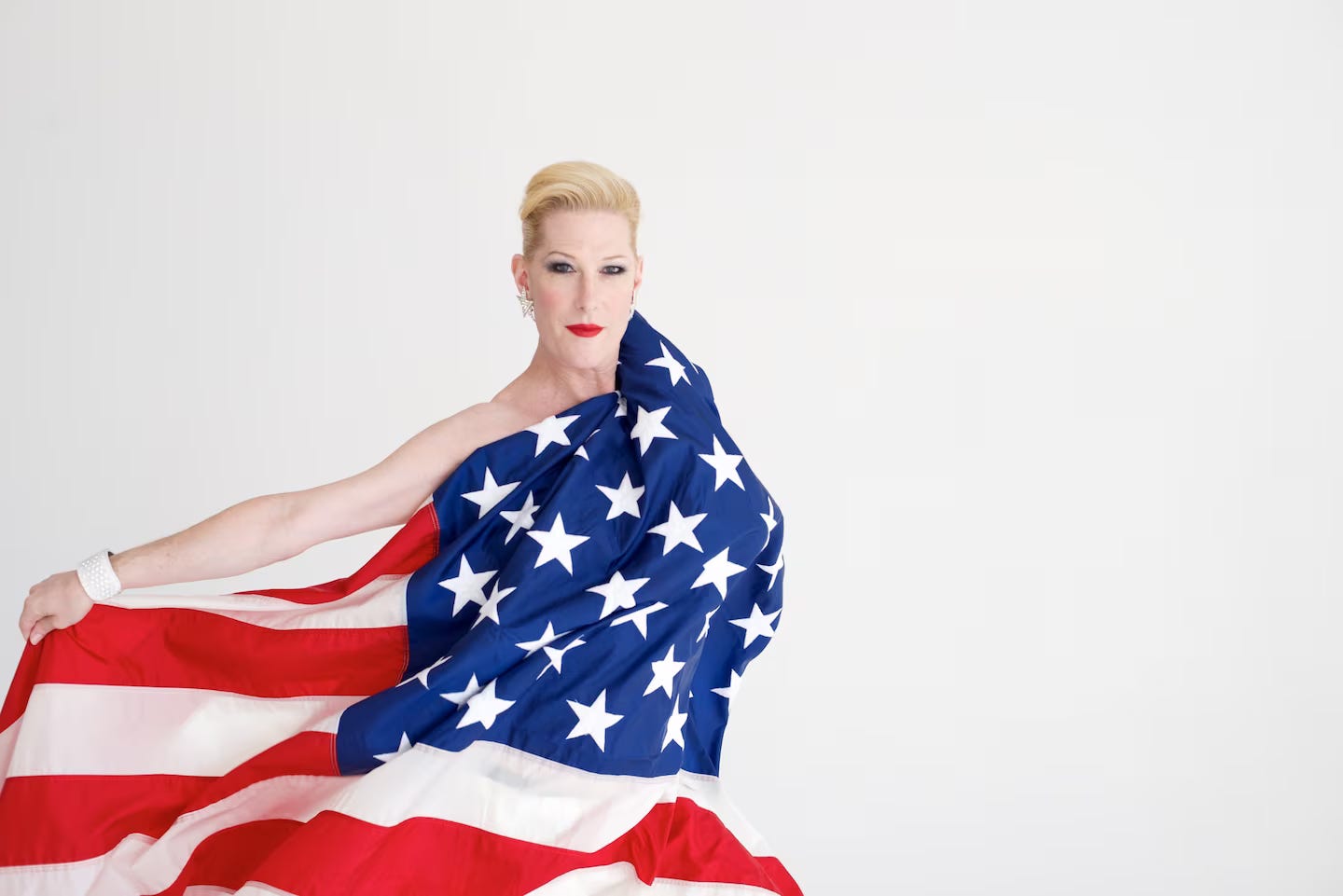22nd Century
On Viv and Nina and Freedom
“When I felt most locked up inside my body” Olivia Laing writes in the final essay of her book Everybody: A Book about Freedom, “almost the only thing that made me feel free was going to Joe’s Pub to see Justin Vivian Bond, a transgender singer and performance artist who had the gift of duende, the knack for going so far beyond the edge of safety that everyone in the room felt shaken loose, transported to somewhere strange and new.”
I myself keep going back to Joe’s Pub, often to see Viv. Most days, I think Joe’s Pub might be my favorite room in New York. A recent profile in The Washington Post notes that the actor and writer Molly Ringwald “used to take new friends to Bond’s shows as a litmus test to see whether she wanted to keep hanging out with them.” I’ve administered this same litmus test many times, most recently during Viv’s annual Pride show. I attended with a close friend who had never seen them perform.
“What if I hate this?” he asked me as the lights went down.
“Then we have nothing in common,” I replied.
He didn’t hate it.
Viv opened that show with a cover of “We’ll Never Turn Back,” a song written in 1963 by Bertha Gober, who was a secretary of SNCC, the Student Nonviolent Coordinating Committee, and part of a musical group called The Freedom Singers. “But we’ll never turn back,” the chorus goes, “until we have all been free.”
Earlier in Everybody, which was published in 2021, Laing writes:
It was beginning to seem as if the great liberation movements of the twentieth century were failing, the victories of feminism, gay liberation and the civil-rights movement overturned one by one, assuming they’d even been secured at all. I’d grown up embedded in some of those struggles, but it had never occurred to me that their painful, inching progress could be so rapidly reversed. What they all shared was a desire to turn the body from an object of stigma and shame into a source of solidarity and strength, capable of demanding and achieving change.
Laing wrote this, of course, before Dobbs v. Jackson overturned Roe v. Wade. Before last week’s Supreme Court rulings striking down affirmative action and allowing a Colorado-based website designer to deny service to LGBTQ+ people.
The concept of ‘freedom’ feels fraught these days, feels contingent and limited and evaporating. But it feels a little more possible, a little more real to me when I’m at Joe’s Pub watching Viv perform.
A few years ago, when I lived in San Francisco, I saw Viv perform at Oasis (incidentally, one of my favorite rooms in that city). It was the first time I saw them perform “22nd Century.” It’s a fever dream of a song, a cyclone that tears through your town, demolishing structures and tearing up the earth. A song on a rampage. A song that is inevitable, that will not be stopped. A song that defies description—or maybe it just exists beyond the reach of my descriptive capabilities. Written in 1970 by the Bahamian musician Exuma, “22nd Century” strikes me as a living organism, at times a prophecy, an elegy, a cri de cœur, an incantation, a wish, a curse, a blessing. Laing, again:
Back in 1970, Exuma had looked into a dark glass, seeing a strange and ashy version of the decades ahead. He predicted a world where everything was in apocalyptic disarray. It came very fast, the words tumbling over each other, a vision of turbulence and instability that hung menacingly in the air. […] It was coming and it was coming now, radiant and terrifying.”
‘Radiant and terrifying’ feels right. A song like a midnight sun. Viv begins their performance with a HA that cracks like a whip. There’s force and fury from the first moments. The opening line—“there is no oxygen in the air”—suffocates. During the chorus, they let out—what to call it?—a cry? The sound of it reaches down into the core of the earth and splits open the sky at the same time.
What in the actual hell—I imagine you asking yourself—is this song? Just watch:
Tomorrow will be the 22nd Century/It will be, it will be, it will be…
I find myself seeking clarity from the song, seeking certainty: and how, exactly, are we supposed to feel about what’s coming? And at that moment, the song closes up on me. The reductiveness of the question slams its doors shut. And then I have to listen to it again.
In reading Everybody, I learned that Nina Simone sang the song, too:
She comes in at her leisure, almost remote against the pulsing calypso rhythm, unfolding a harrowing vision of unbreathable air, deformed and damaged people. Everything is changing, changing, changing. Gender has become unstable, right wing slips into left, the people with the power no longer have control, time itself upends. Her voice is menacing, absolutely authoritative and yet she also wrings something joyful from the litany of disasters ahead.
The most powerful songs in her repertoire were the ones that allowed her to express mixed feelings, to carry rage, hatred, bitterness alongside yearning, joy coupled with despair. She once said she had a narrow vocal range, but she knew how to make her voice change shape, roiling from gravel to honey and back again. Like ‘Pirate Jenny’ and ‘Mississippi Goddam’, ‘22nd Century’ is one of the gravel songs, in which her ongoing vision of liberation is yoked to a nine-minute fantasy of retribution and punishment, judgment day come at last. Exuma’s apocalypse song allows her to slice back and forth, a prophetess of a post-human future in which all the tortuous old bodily categories have been dissolved.
Changing, changing, changing
At times, like now, when I’m feeling particularly hyperbolic, “22nd Century” strikes me as a container nearly capacious and durable enough to hold all the stuff of life. A song that can simultaneously acknowledge the past, exist in the present, and see the future.
“It’s just a feeling,” Simone begins, when asked by an interviewer what freedom means to her. You can see her working through her answer. What does she believe, and how to articulate that belief in words? She arrives at: “I’ll tell you what freedom means to me: no fear.” You can see her grappling with this thought, pressure testing it. “That’s not all of it,” she qualifies, searches for more. “Like a new way of seeing. A new way of seeing something.”
Fear has, for a very long time, been the engine of my life. I joke—joke?—with my therapist that my default posture is a defensive crouch. Waiting for the fists to land, for the other shoe to drop, for the earthquake to strike. Waiting to see what I’ll need to react to, rather than focusing on who and how I want to be.
I’ve been working on chipping away at that fear. Progress is maddeningly slow and not linear. And what will fill the space the fear previously inhabited? What will the new engine of my life be? I have some ideas. And artists like Viv and Nina—artists who embody their freedom, who through their art demonstrate what a practice of freedom and fearlessness can look like—help expand my sense of the possible.
It will be, it will be, it will be
Leaving the last word for Laing:
Violence is a fact, and yet whenever I’ve sat in Joe’s Pub watching Viv or listened to Nina Simone sing, I’ve felt the room expand around me. This is what one body can do for another: manifest a freedom that is shared, that slips under the skin. Freedom doesn’t mean being unburdened by the past. It means continuing into the future, dreaming all the time. A free body need not be whole or undamaged or unaugmented. It is always changing, changing, changing, a fluid form after all. Imagine, for a minute, what it would be like to inhabit a body without fear, without the need for fear. Just imagine what we could do. Just imagine the world that we could build.





Flawless. Thank you for this, and please keep writing.
Also, let’s please go to the next Viv show at Joe’s Pub together! Just saw them there a few weeks ago. ❤️